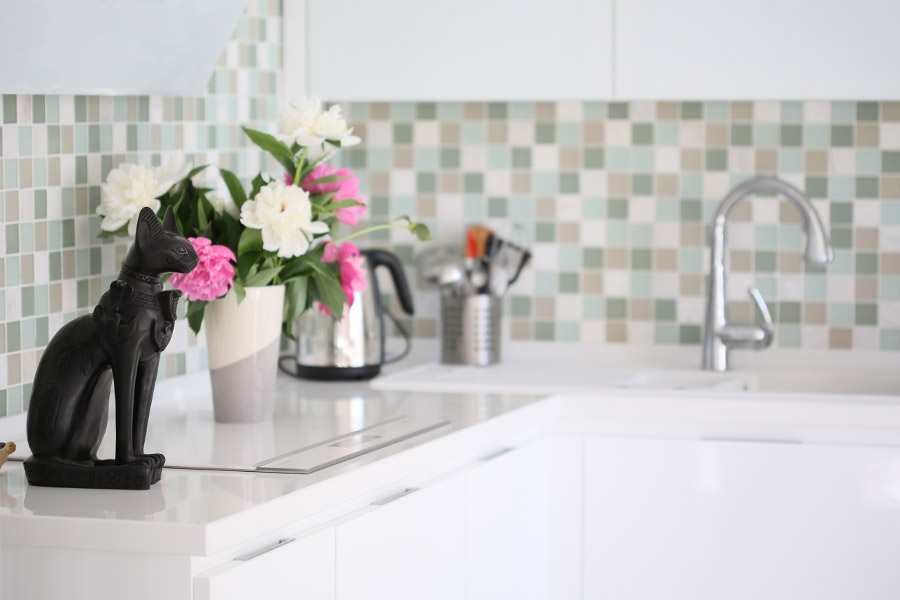
Whether it's quartz, granite or solid surfaces, choosing the right material depends on your aesthetic preferences and lifestyle, so it's prudent to understand the pros and cons of quartz countertops.
There are a million things to be said about the pros and cons of Quartz countertops. Some praise its virtues as if they were the physical manifestation of everything right the world of kitchen decoration and bar tops. However, there are misconceptions that will convince a person to walk away just at the sight of the material.
The Pros of Quartz Countertops
Although its name might lead you to think of natural stone, the quartz in the decorative stone industry is really an engineered composite. It’s a combination of a high percentage of crushed quartz (about 90 to 94 percent)with a binding polymer resin to create a hybrid material that has been the best of both natural stone and synthetics (e.g. solid surface, laminates) for over a decade already. With that in mind, let’s explore the primary pros and cons of quartz countertops:
1. NON-POROUS
Unlike natural stones that has microscopic pores over its entire surface, the polymer resin in between the crushed quartz bits evenly fill out the gaps of the surface. This contributes towards the durability aspect of quartz countertops being very resistant to stains, liquids and pigmentation.This makes cleaning a quartz surface less of a chore as any mess or spills simply glide off the surface with ease.
More importantly, however, is that non-porous quartz countertops are highly antimicrobial, a desirable characteristic where hygiene is of concern. Without microscopic gaps or spaces on the surface of the material for microorganisms to latch on to, it significantly inhibits their ability to grow and form colonies.
Many common bacteria, such as Staphylococcus aureus,which you can find living on your own skin even, produce dangerous toxins that are difficult to destroy. Therefore, it is DEFINITELY recommended that you notlet them breed in the first place.
Worst case scenario however, pores can trap liquids in between solid surfaces – making it the perfect place for many common types of bacteria to start building biofilms. Biofilms protect the bacteria and can make getting rid of them a million times harder than it should have been.
2. HEAT-RESISTANT
Compared to other synthetic-based options, such a solid surface and laminate, quartz will not bend and warp if it were to come into contact with hot objects. It can withstand heat up to roughly 204 degrees Celsius.In addition to that, burn marks on quartz countertops can be removed by sanding down the surface. Solid surfaces or laminated countertops, however, would’ve popped and sizzled into an unsalvageable mess and must be replaced if exposed to extremely high temperatures.
3. SCRATCH RESISTANT
Having its build composed almost entirely of hard quartz mineral, quartz countertops will blunt knives and other sharp metal objects before it would suffer from surface damage. But while the resin is still soft and susceptible, very little of it is exposed on the surface, and is unlikely to scratch except in the most severe worst case scenarios. Still, it’s far more durable compared to solid surface countertops, which scratch and gets cut easily.
4. IMPACT RESISTANT
Quartz countertops can absorb substantial impacts and exhibit greater durability to cracking compared to granite, thanks to the polymer resin granting compressibility in between the crushed quartz. Flexible and elastic,the resin serves as shock absorbers that disperses the energy from an impact evenly before it reaches the hard but brittle stone – it’s the same physics concept seen in Kevlar that makes it so resistant to high-speed projectiles.
In addition, the granules of crushed quartz in the flexible resin polymer matrix provides even more tolerance that further helps disperse high kinetic absorption which would otherwise be destructive to the surface.
The Cons of Quartz Countertops
If there is one often recurring theme in the world, it’s the balance of positive aspects and negative aspects. With the polymer resin filling in quartz countertops contributes to many of its advantages, it’s also one of the main cause of its disadvantages. Some of which, we’ve listed below:
1. EXPENSIVE
Probably the first thing anyone in the world would notice is the price tag. Costing 18% less than granite on average, and 54% more expensive than solid surfaces or 270% more than laminate, quartz countertops can be very demanding for your bank account. Nevertheless, its durability, ease of maintenance and hygienic benefits more than makes up for its price.
2. NOT SUITED FOR OUTDOOR USE
Although great for your kitchen, quartz countertops aren’t the best choice for the great outdoors. Prolonged exposure to the elements will fade the material out quicker as the polymer resin and its color pigments react to constant sunlight and chemicals in the rain and air.
It is also more likely to get scratched due to the presence of outdoor activities and the general harshness of physical treatment people will give it because they’re outside. While that isn’t to say that quartz cannot be used outdoors, there are simply better options to choose from,such as granite, stainless steel or even concrete due to their ease of replacement and lower price tag.
3. NOT PERFECTLY HEAT RESISTANT
While it will not melt and warp like solid surfaces countertops would, placing a hot object directly on quartz is probably one of the worse ways to treat your countertop. Using a pad or trivet will completely circumvent this thermal concern, but there are times when you might just forget to use them by accident.
Source: MSN Network
View Original Post


